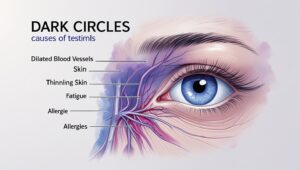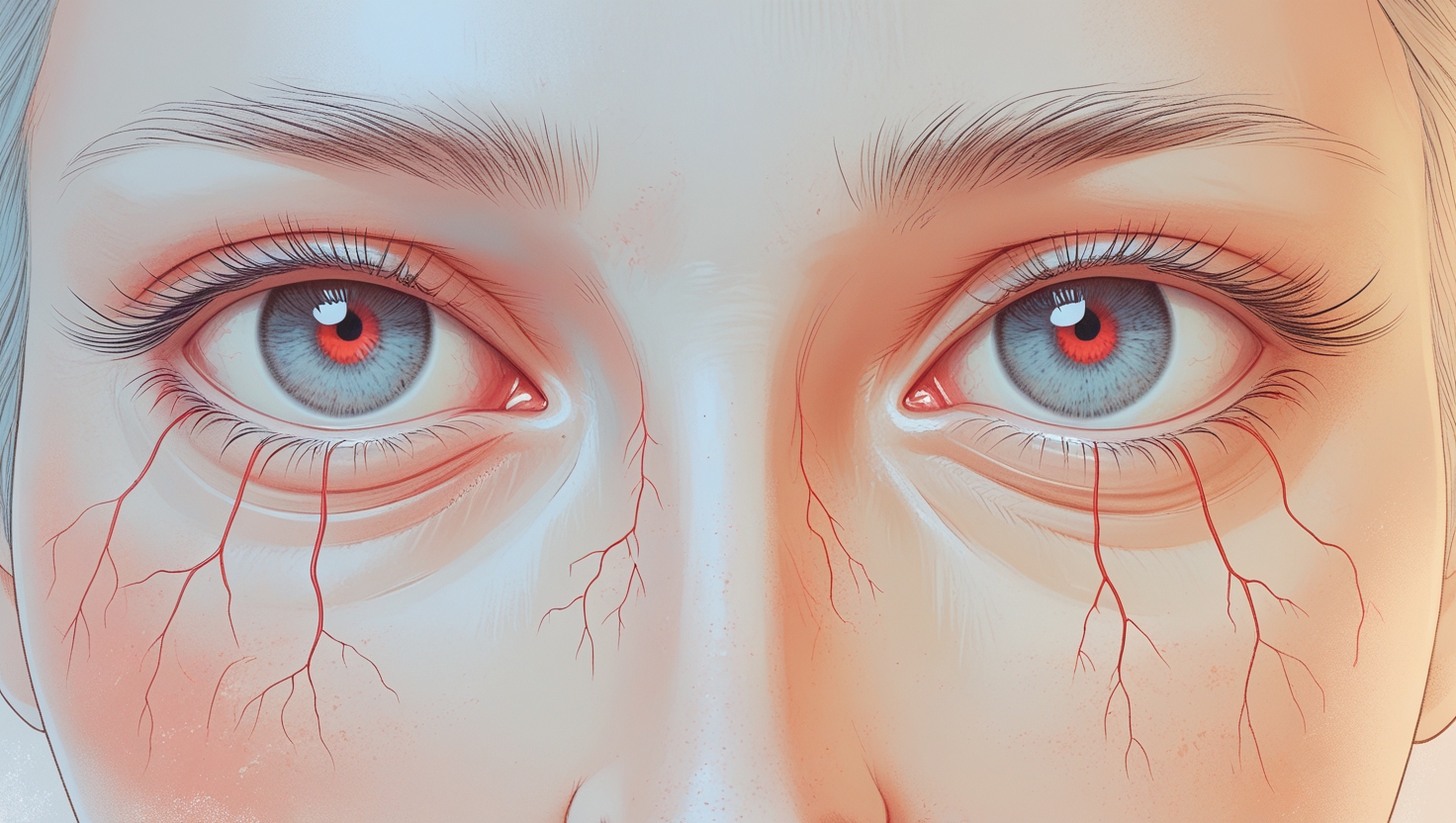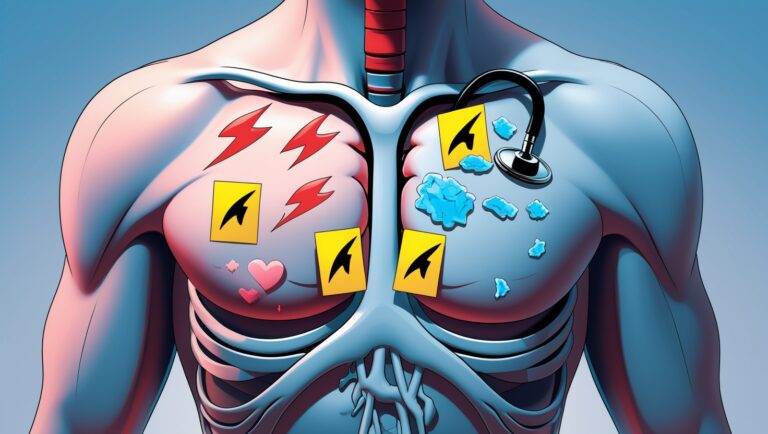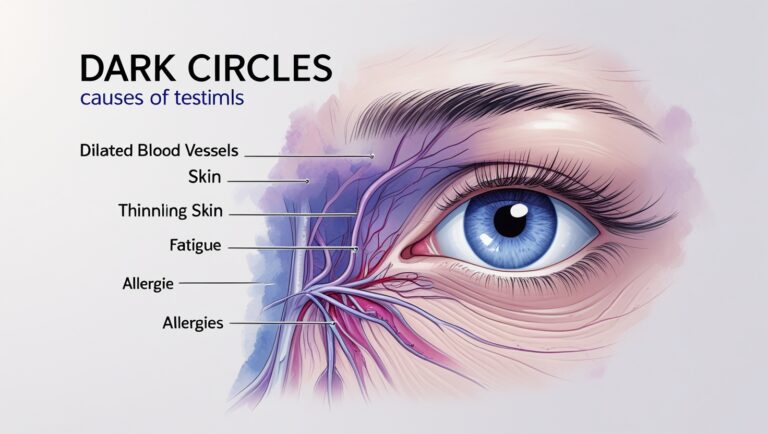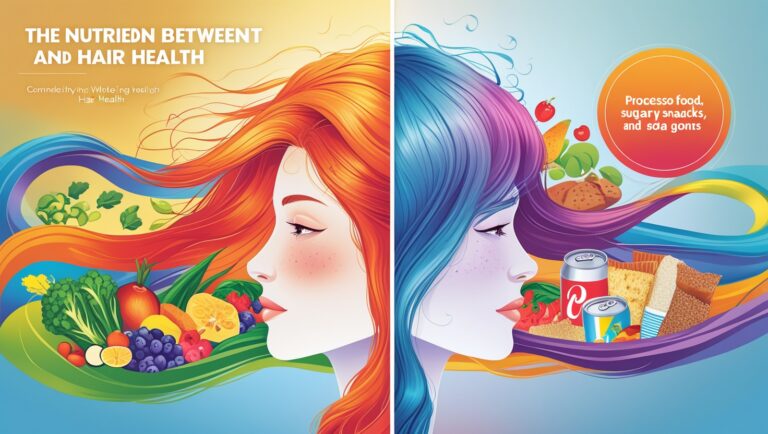Table of Contents
- Introduction
- What Is Eye Redness?
- Common Causes of Frequent Red Eyes
- Real-Life Scenarios: Why Your Eyes May Be Red
- Symptoms That Accompany Eye Redness
- When Is Red Eye a Sign of Something Serious?
- At-Home Remedies for Mild Redness
- How to Prevent Red Eyes in Everyday Life
- Medical Treatments for Chronic Redness
- Tips for Digital Eye Health in 2025
- Myths About Red Eyes
- Final Thoughts and What to Do Next
1. Introduction
Have you ever looked in the mirror and noticed your eyes are red—again? Whether it’s a daily annoyance or an occasional surprise, red eyes are a common problem that can leave you looking tired, irritated, or even unwell.
This guide will walk you through the most common reasons your eyes might be turning red frequently, explain when to be concerned, and offer practical tips to soothe and prevent eye redness. Let’s uncover the causes and solutions so your eyes can feel refreshed and healthy every day.
2. What Is Eye Redness?
Eye redness happens when the blood vessels on the white part of your eye (the sclera) become swollen or irritated. This can be mild and short-lived or persistent and uncomfortable.
Types of redness include:
- Diffuse redness: Evenly spread across the sclera
- Localized redness: In a specific area, often due to injury or burst blood vessel
- Accompanied redness: With other symptoms like itching, discharge, or pain
3. Common Causes of Frequent Red Eyes
Allergies
- Pollen, pet dander, dust mites
- Often seasonal
Symptoms: Itchy, watery eyes; sneezing; nasal congestion
Dry Eye Syndrome
- Not enough tear production or poor tear quality
Causes: Aging, screen time, wind exposure, certain medications
Symptoms: Grittiness, burning sensation, blurry vision
Eye Strain (Digital Eye Fatigue)
- Long hours on screens (phone, computer, TV)
Symptoms: Tired, sore, and red eyes
2025 Tip: Use blue-light filters and take screen breaks (20-20-20 rule)
Conjunctivitis (Pink Eye)
- Viral, bacterial, or allergic inflammation
Symptoms: Redness, itching, discharge, crusty eyelashes
Contagious: Yes, especially viral and bacterial forms
Contact Lens Irritation
- Overuse, improper cleaning, or allergic reaction
Symptoms: Redness, discomfort, blurry vision
Tip: Replace lenses as recommended and keep them clean
Environmental Factors
- Smoke, pollution, dry air, wind
Common in cities or dry climates
Lack of Sleep
- Inadequate rest causes eye blood vessels to dilate
Symptoms: Puffy eyelids, dark circles, red eyes
Smoking or Alcohol Use
- Both irritate eye tissues and reduce tear production
Health Tip: Cut back for better overall eye health
Eye Infections or Injuries
- Scratches (corneal abrasions), styes, or foreign objects
Symptoms: Sharp pain, redness, tearing, light sensitivity
Underlying Health Conditions
- Autoimmune diseases (like rheumatoid arthritis)
- Blepharitis (eyelid inflammation)
- Glaucoma
Note: Persistent redness should be evaluated by an eye doctor
4. Real-Life Scenarios: Why Your Eyes May Be Red
- After a night out: Alcohol and lack of sleep = red, irritated eyes
- During allergy season: Redness with itchy, watery eyes
- Working from home all day: Hours on Zoom = digital strain
- Wearing old contact lenses: Reduced oxygen to the eye = redness
5. Symptoms That Accompany Eye Redness
Pay attention if you also experience:
- Pain or pressure
- Blurred vision
- Sensitivity to light
- Yellow or green discharge
- Feeling like something is stuck in your eye
These symptoms may point to a more serious problem.
6. When Is Red Eye a Sign of Something Serious?
See an eye doctor if:
- Redness lasts more than a few days
- It comes with vision changes
- You have eye trauma or a foreign object
- There’s significant pain, swelling, or discharge
- You have a history of eye disease or surgery
Don’t delay treatment—early intervention can prevent permanent damage.
7. At-Home Remedies for Mild Redness
- Artificial tears: Lubricate dry eyes
- Cold compress: Reduces inflammation
- Avoid rubbing your eyes: Prevents further irritation
- Switch contact lenses: Or stop wearing them temporarily
- Use antihistamine drops: For allergy-related redness
8. How to Prevent Red Eyes in Everyday Life
- Get 7–8 hours of sleep
- Stay hydrated to support tear production
- Wear sunglasses to block UV rays and dust
- Take screen breaks every 20 minutes (20-20-20 rule)
- Use a humidifier in dry environments
- Practice good contact lens hygiene
- Limit alcohol and smoking
9. Medical Treatments for Chronic Redness
If redness doesn’t improve with lifestyle changes, your doctor may recommend:
- Prescription eye drops (steroids, antibiotics, or antihistamines)
- Lid hygiene routines for blepharitis
- Punctal plugs to treat chronic dry eyes
- Allergy testing to identify triggers
- Treatment for glaucoma or infections
10. Tips for Digital Eye Health in 2025
With more screen time than ever, protect your eyes by:
- Using blue light filters on all devices
- Wearing blue-light-blocking glasses if needed
- Increasing text size and contrast on screens
- Setting screen brightness to ambient light levels
- Blinking consciously to avoid dry eyes
11. Myths About Red Eyes
- Myth: Red eyes mean you’re high or drunk
- Truth: Could be allergies, fatigue, or dry eyes
- Myth: Eye drops are always safe
- Truth: Overuse can worsen redness
- Myth: Rubbing your eyes helps relieve itching
- Truth: It makes irritation worse
12. Final Thoughts and What to Do Next
Red eyes can be annoying, uncomfortable, and sometimes a sign of something more serious. Most causes are harmless and manageable with the right habits and a bit of care.
Take Action Today:
- Track when your redness happens and what might trigger it
- Try preventive lifestyle tips and at-home remedies
- See an eye doctor if symptoms persist, worsen, or involve pain
Want more tips on protecting your vision and overall eye health? Subscribe to our newsletter, share this article with friends, or schedule a vision check-up today.
Healthy eyes start with smart habits. Keep your vision clear and bright in 2025 and beyond.
Visit for more :- Greakstive
External References & Further Reading:
- Red Eye: Causes, Treatment & Prevention
- 20 Causes, Symptoms, and Complications of Red Eyes
- Red and Bloodshot Eyes: Causes, Treatment, … – GoodRx

